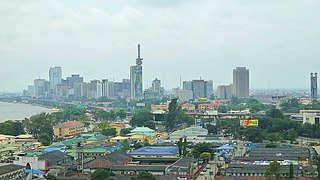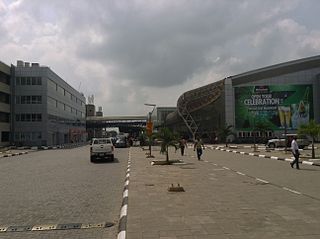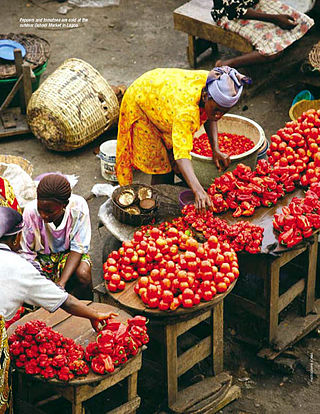
Lagos or Lagos City is the most populous city in Nigeria, with an estimated population of 21 million in 2015. The estimated population for Lagos was more than 26 million in 2023; and around 30 million for the Lagos metropolitan area. Lagos is the most populous urban area in Africa. Lagos was the national capital of Nigeria until December 1991 following the government's decision to move their capital to Abuja in the centre of the country. Lagos is a major African financial centre and is the economic hub of Lagos State and Nigeria at large. The city has been described as the cultural, financial, and entertainment capital of Africa, and is a significant influence on commerce, entertainment, technology, education, politics, tourism, art, and fashion. Lagos is also among the top ten of the world's fastest-growing cities and urban areas. The megacity has the fourth-highest GDP in Africa and houses one of the largest and busiest seaports on the continent. The Lagos metropolitan area is a major educational and cultural centre in Sub Saharan Africa. Due to the large urban population and port traffic volumes, Lagos is classified as a Medium-Port Megacity.

Ikeja is the capital city of Lagos State in southwestern Nigeria. Its population, as of the 2006 census, is 313,196. Prior to the emergence of military rule in the early 1980s, Ikeja was a well planned, clean and quiet residential and commercial town with shopping malls, pharmacies and government reservation areas. It lies 10.5 miles (17 km) northwest of Lagos city. The Murtala Muhammed International Airport is located in the city. Ikeja is also home to Femi Kuti's Africa Shrine and Lagbaja's Motherland, both venues for live music. Its Ikeja City Mall is the largest mall on the Lagos State mainland. Ikeja also has its own radio station, broadcasting both in English and in Yoruba.

Lagos State is a state in southwestern Nigeria. Of the 36 states, it is both the most populous and smallest in area. Bounded to the south by the Bight of Benin and to the west by the international border with Benin, Lagos State borders Ogun State to the northeast making it the only Nigerian state to border only one other state. Named for the city of Lagos—the most populous city in Africa—the state was formed from the Western Region and the former Federal Capital Territory on 27 May 1967.

Ikoyi is the most affluent neighborhood of Lagos, located in Eti-Osa Local Government Area. It lies to the northeast of Obalende and adjoins Lagos Island to the west, and at the edge of the Lagos Lagoon. Popular with the extreme upper class residents of Nigerian society, Ikoyi is arguably one of the wealthiest communities within Nigeria.

Lagos Island is the principal and central local government area (LGA) in Lagos, it was the capital of Lagos State until 1957. It is part of the Lagos Division. As of the preliminary 2006 Nigerian census, the LGA had a population of 209,437 in an area of 8.7 km2. The LGA only covers the western half of Lagos Island; the eastern half is simply referred to as Lagos Island East LCDA.

Yaba is a suburb located on Lagos Mainland, Lagos in Lagos State, Nigeria. There are several federal government institutions in the area, which include Queen's College, the Nigerian Institute of Medical Research, the Yaba College of Technology, Igbobi College, the University of Lagos, the Federal Science and Technical College, and the Federal College of Education (Technical) Akoka.

Area boys are loosely organized gangs of street children, teenagers and youths, composed mostly of males, who operate on the streets of major cities in Nigeria, including Lagos, Ibadan, Onitsha, Aba, Umuahia, Akure, Ado-Ekiti and Enugu. They extort money from passers-by, public transporters and traders, sell illegal drugs, act as informal security guards, and perform other "odd jobs" in return for compensation.

Carter Bridge built in 1901 is one of three bridges connecting Lagos Island to the mainland, the other are the Third Mainland and Eko bridges. At the time of its construction, this was the only bridge connection between the mainland and Lagos Island. The bridge starts from Iddo on the mainland and ends at Idumota area of Lagos Island.

Surulere is a residential and commercial Local Government Area located on the mainland of Lagos in Lagos State, Nigeria, with an area of 23 km2 (8.9 sq mi). At the last census in the year 2006, there were 503,975 inhabitants, with a population density of 21,864 inhabitants per square kilometer. The local government area is bordered by Yaba, Mushin and Ebute-Metta.

Crime in Nigeria is investigated by the Nigerian Police. Nigeria is considered to be a country with a high level of crime, ranking 17th among the least peaceful countries in the world. During the first half of 2022, almost 6,000 people were killed by jihadists, kidnappers, bandits or the Nigerian army.

Badagry, also spelled Badagri, is a coastal town and Local Government Area (LGA) in Lagos State, Nigeria. It is quite close to the city of Lagos, and located on the north bank of Porto Novo Creek, an inland waterway that connects Lagos to the Beninese capital of Porto-Novo. The same route connects Lagos, Ilaro, and Porto-Novo, and shares a border with the Republic of Benin. As of the preliminary 2006 census results, the municipality had a population of 241,093.
Brazilians in Nigeria, Amaros or Agudas consist of the descendants of freed Afro-Brazilian slaves who left Brazil and settled in Nigeria. The term Brazilians in Nigeria can also otherwise refer to first generation expatriates from Brazil.
The Computer Village is an Information and Communications Technology (ICT) accessories market located in a community called Otigba, located at Ikeja, the capital of Lagos State, southwestern Nigeria. The market is the largest ICT accessory market in Africa. It is a perfect competition market, under the umbrella of the Computer and Allied Products Dealers Association of Nigeria (CAPDAN).

Ojo is a town and local government area in Lagos State, Nigeria, with a few notable locations such as Lagos State University and the Alaba International Market as well as others. Ojo is located on the eastern section of the Trans–West African Coastal Highway, about 37 km west of Lagos. It is a part of the Lagos Metropolitan Area.
Soldier Idumota sometimes called Unknown Soldier, is a cenotaph located in Idumota, a suburb of Lagos, in Lagos State, Nigeria. It was built and erected in 1948 by the Nigerian government to commemorate the soldiers who died during World War I and World War II.

Oshodi Market is a market located in Oshodi, a suburb of Lagos state, southwestern Nigeria. It is one of the largest markets in the Lagos metropolis although it is claimed, by government officials, to be blighted by criminal activity such as pickpocketing and bag snatching, and it has been decided to demolish the market. The market was razed in January 2016.
Ijora is a settlement in Lagos, Nigeria.
The Lagos International Trade Fair Complex is a 350 hectare facility along Lagos-Badagry expressway hosting a number of market traders. The facility was constructed in the 1970s and planned to host an international trade fair upon fulfillment. In 2002, jewelry, auto spare parts and other consumer goods traders from Balogun Market on Lagos Island relocated to the complex. Today, the complex host traders representing a number of trade factions including Balogun Business Association, Auto Spare Parts And Machineries Dealers Association (ASPMDA), and jewelers under the banner of Association of Progressive Traders.













